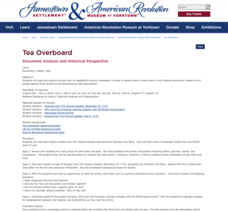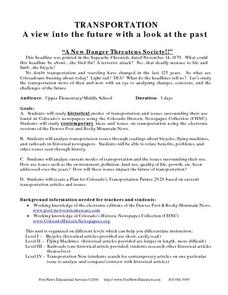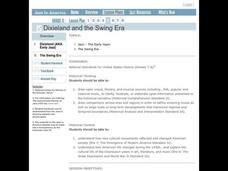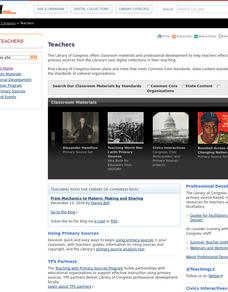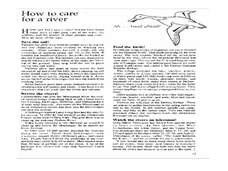Curated OER
Nellie Bly's Newspaper Club: Introducing the Science of Writing
Students evaluate a video about Nellie Bly, a famous reporter from the 19th century. They consider what makes a high-interest news article, write an essay in pairs and present it a literary tea.
Stanford University
Beyond Vietnam
On April 4, 1967 Martin Luther King, Jr. delivered his speech "Beyond Vietnam." The controversy that followed is the focus of a three-lesson unit that asks class members to consider the political and social implications of King's stance.
PBS
Who Knows Best
Finding an expert in a given field when conducting research can be a challenge. This guide provides step-by-step directions as well as links to resources that help young sleuths find the authorities and experts they need. As a bonus, two...
Curated OER
The Mystery of History-Original Sources
Students research the events surrounding the Alamo in 1863, and explore the differences between primary and secondary sources of information. They brainstorm lists of items used to research a subject and categorize them as primary or...
Curated OER
Author's Purpose Lesson Plans
Why do we practice identifying the author's purpose? Read this article to gain a better understanding of this reading strategy, and then peruse the attached lesson plans!
Curated OER
March 2, 1877: Hayes Declared Winner in Disputed Presidential Election
After reading an interesting article comparing the disputed presidential election of 1877 to a similar event in the year 2000, kids blog a response. They read the article, check out the embedded links, then respond to four related...
Sargent Art
Improvisation: Dada and Surrealism
Images of works by Salvador Dali, Luis Bunuel, and Man Ray launch a study of Dada and Surrealism. After critiquing works by these and other artists, class members gather their own images and arrange them into a cohesive composition.
Museum of Tolerance
Influence of Media
We are bombarded with media images expressly designed to influence viewers. Learning how to analyze the intended effects of these images is essential and the focus of an activity that asks viewers to use the provided questions to guide...
Southern Poverty Law Center
Evaluating Online Sources
All sources are pretty much the same, right? If this is how your class views the sources they use for writing or research projects, present them with a media literacy lesson on smart source evaluation. Groups examine several articles,...
Jamestown-Yorktown Foundation
Tea Overboard
While less well known than the event in Boston, the Yorktown Tea Party was equally decisive in turning community sentiment against Great Britain. To gain an understanding of why the colonists objected to the Tea Act, young historians...
Stanford University
Explosion of the Maine
An intriguing lesson features newspaper articles to help academics understand the political impact of the sinking the Maine and how the American media depicted the event. Scholars also view a presentation, participate in group...
Curated OER
Remember the Bridge: Poems of a People
Fifth graders explore poems of African Americans. They research a famous African American, write a report, create a timeline of events in African American history, create a map of the New World, and research Molly Walsh. After...
Curated OER
TRANSPORTATION- A view into the future
Pupils research various modes of transportation in order to comprehend the current trends and challenges that face the Colorado area. They take the information and convert it into a presentation.
Curated OER
Jazz in America
Eleventh graders explore Jazz in America. They examine greats in Jazz, such as Duke Ellington. They are also to discuss the cultural implications of the music itself.
Curated OER
Jazz in America
Students explore the Swing Era and its implications. They answer questions and listen to music from the era.
Curated OER
When Work is Done
Eleventh graders create an album based on a thesis statement about life in the 20th century after completing the introductory lesson for a lesson on the web site "When Work is Done".
Curated OER
Near v. Minnesota
Students discuss what free press means and what it would be like without this right. They read the summary from the Near v. Minnesota case. In groups, they analyze a problem and report to the class.
Curated OER
Why Kosovo? Why Now?
Middle schoolers explain the establishment of the modern state of Yugoslavia and the breakup of the country. They examine the human characteristics of the region - ethnic groups, languages, and religions.
Curated OER
Freed Slaves
Students are given the identify of a newly freed slave at the end of the Civil War. Students participate in a discussion to explore some of the difficulties and decision making freed slaves had to consider. Students present their...
Curated OER
Design Explorations: Frieze Patterns
Students will explore frieze patterns. A frieze pattern is a mathematical concept to classify designs on two-dimensional surfaces, which are repetitive in one direction, based on the symmetries in the pattern. They will explore examples...
Curated OER
The Delicate Balance - Iowa's Natural Resources
Discover the natural resources in Iowa by studying it's history. In this environmental lesson, your students will observe a topographical map of Iowa and identify where its most valuable resources are. They complete an Iowa name...
Curated OER
The Freedom to Fight
High schoolers study the African American troop experiences in the Civil War. In this American history lesson, students examine primary and secondary sources regarding the experiences and contributions of African American soldiers who...
Curated OER
Rationalizing Race in US History
Students consider the classification of people. In this race studies lesson, students examine the concept of race as it relates to U.S. history and trends. Students research racial discrimination and prejudice in order to support their...
Curated OER
EARLY CIVILIZATIONS
Students compare and contrast the monuments of four ancient cultures and draw conclusions about the origins, construction, and purposes of these structures.











